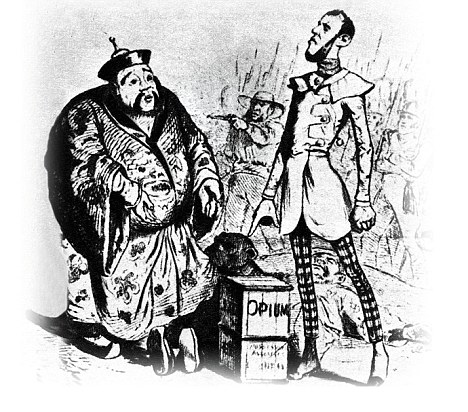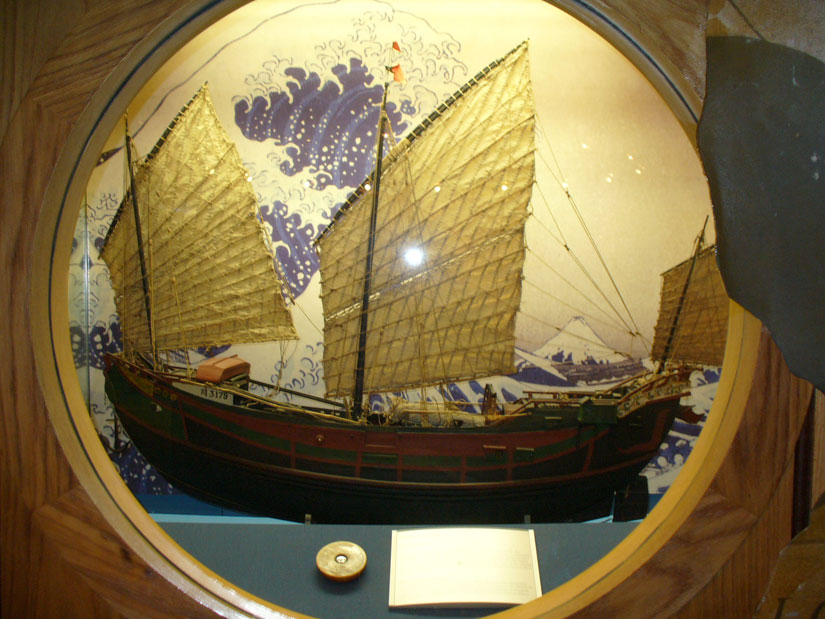The Chinese Diaspora
Yellowface
East Asian faces and voices are almost completely excluded from British culture and politics
The stereotypes get a makeover
Anna Chen looks at how the mass manipulation of East Asian representation in the culture is still with us and being ratcheted up for western geopolitical ends
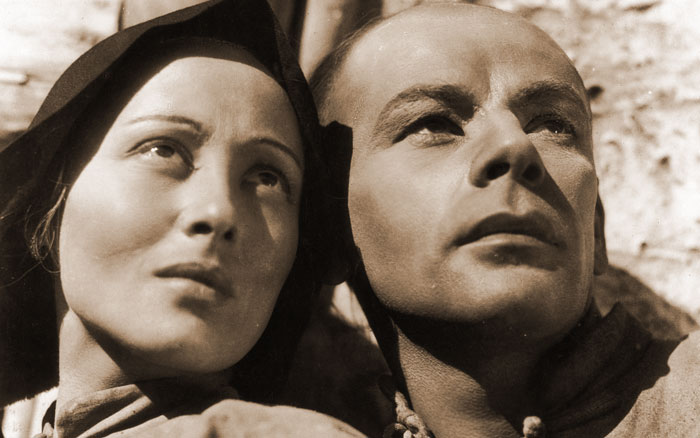
How on earth do you excise an entire race from the culture?
Dehumanisation starts when a group is rendered invisible and turned into a blank canvas onto which constructed images are projected, thereby supplying a permanent reservoir of scapegoats. A raft of Chinese exclusions, despite Britain’s record of colonisation — which was always about dominance and never about an engagement of equals — creates a void in which to embed yellow peril stereotypes deep inside the collective unconscious. Yellowface is one means of erasure.
If invisibility fails, then Yellow Peril is the fall-back. The yellow press of 19th and 20th century Empire aided in the oppression of the yellow person by relentlessly vilifying them. Cartoons, literature and later the movies reimagined the Chinese as barely human creatures, unworthy of ‘our’ sympathy.
The rapacious envy of China and its riches continues beyond the near-capsizing, at the hands of Britain’s global ambitions, of its status as the most technologically advanced and oldest unbroken civilisation in the world.
The Opium Wars
The rationalisation for the East India Company’s Opium Wars, backed up by the British army, had to start somewhere. How can you justify mass murder, theft, destruction and the imposition of opium onto an entire nation if their humanity is apparent?
Britain’s craving for chinoiserie in the 18th and 19th centuries resulted in a trade imbalance which threatened to empty the treasury. In order to pay for the tea, silks, spices and porcelain we liked so much, the East India Company used industrial methods to mass-produce enormous quantities of cheap Bengal-grown opium and, along with other British merchants, forced it on to China at gunpoint with the aid of the British Navy, turning what had been an expensive aristocratic vice into a nationwide addiction.
Britain’s early encounters with the Chinese had been positive ever since, in the 17th century, Jesuit priest Michael Shen Fu-tsung helped the Bodleian Library catalogue their Chinese books and was welcomed at the palace by King James II. However, the last thing the East India Company narco-capitalists needed during their rampage was the Chinese enjoying a good press. For the colonisers of Hong Kong, keeping public opinion onside was crucial to maintaining their dominance. This, inevitably, required the manipulation of public perception.
Literary (mis)representation
Caricatures of ‘evil incarnate’ reached their apogee with Sax Rohmer’s lurid Fu Manchu books: the populist-pulp eruption into the public sphere of the cliche that had taken root over a century of collective character assassination.
Modern iterations, such as James Bond’s Dr No, Cold War communists and Flash Gordon‘s Emperor Ming the Merciless, kept the evhul image going, with the occasional outing for servants like the comical Kato in The Pink Panther (even more stupid than the useless Frenchman Inspector Clouseau – a two-for-one for British audiences) and The Green Hornet’s Kato (no original thought, these western writer chaps), a subservient role later dumped by a fed-up Bruce Lee. The role Lee wanted the most, the peripatetic monk Kwai Chang Caine in the 1972 Kung Fu series that he created, was given to David Carradine, a white actor, who played the character with suitable submissiveness.
Rare breakthroughs include just about any role played by Michelle Yeoh and Jackie Chan. But not in Britain.
Empire gets a second bite at the cherry
As China crawls out from the wreckage left by imperialist forces, and catches up with the declining superpower, the US-led West’s covetous aim to slaughter the Golden Goose arises again — alongside those age-old imperatives to prevent empathy. The culture is where sympathies are born and nurtured. We identify with the heroes of stories; we feel their pain, we share their joy in love and victory. We take pleasure in our heroes’ fortunes. This response has to be snuffed out if the raiding conquerors are to achieve their objective.
Today, everyone receives the memo, signalled at dog-whistle pitch. That you don’t need a beaten dog when a well-trained one will do as is proven with near-total media collaboration in the symbolic obliteration of the humanity of a fifth of the world’s population from our daily lives and mass culture: east Asians being collateral damage in these psychological war games. Empire wants its conquered victims kept unknown and mysterious, or cowed, submissive and hated when breaking cover, especially if it’s going for another bite at the cherry. Certainly not to be identified with and respected as being ‘like us’, however much the model minority might try to ingratiate itself with the top table.
Perhaps the ultimate insult is to be replaced by white actors when anything juicy surfaces. There are many contenders. Luise Rainer was cast as the wife in the MGM movie of Pearl S Buck’s Pulitzer Prize-winning blockbuster, The Good Earth, depriving Anna May Wong of the major role for which she was so perfect. It could have broken the bamboo ceiling and allowed her to be recognised as a stellar actress. There’s Beatrice Lillie in Thoroughly Modern Millie; a weird Christopher Walken (isn’t he always) as Feng in Balls of Fire; Jonathan Pryce in the stage version of Miss Saigon. Like so:
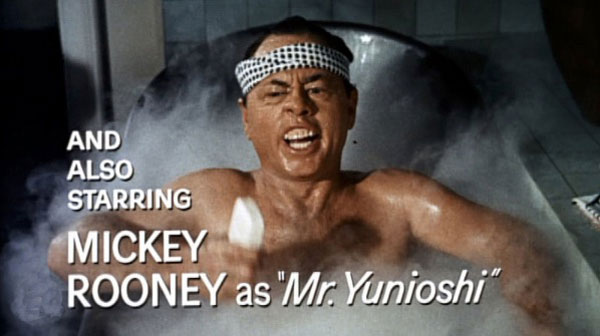
The Good Earth: Probably the most famous egregious example of yellowface casting which excluded Anna May Wong, Hollywood’s first Chinese superstar, depriving her of the chance to elevate her work from populist potboiler stereotype to quality cultural excellence and A-list actress. 30 December 2008
Anna May Wong: A Celestial Star in Piccadilly, BBC R4. Profile of Hollywood’s first screen legend and how she challenged limits for Chinese in the US. 2009
Hedge fund theatre in Howard Barker yellowface protest at The Print Room, 2017: Despite being set in “ancient China”, all the Chinese-named characters are played by white actors, rendering us invisible, dehumanised and vulnerable at a time when anti-Chinese feeling is being whipped up by forces who want war with China.
The Orphan of Zhao theatre review in the Morning Star. Only three out of 17 actors are east Asians, but none in leading roles, thereby missing a golden chance to rectify invisibility with something imaginatively groundbreaking. 15 November 2012
The Orphan of Zhao: South China Morning Post magazine: Now is the winter of our discontent. When the hallowed Royal Shakespeare Company cast east Asian actors in a miserly three roles out of 17 in the Chinese classic, The Orphan of Zhao, (AKA,”the Chinese Hamlet”), they sparked an uprising of British east Asians that was to gather support from as far afield as the Americas and Australia. Their production was a British courtship of Chinese moolah that included research trips to China and ads in Mandarin, and yet we were virtually excluded from both cultures. 16 December 2012
Memo to the RSC: east Asians can be more than just dogs and maids, Guardian, 22 October 2012. It was with a sense of “here we go again” that we learned the esteemed Royal Shakespeare Company (RSC) is mounting the 13th-century Yuan-dynasty masterpiece, The Orphan of Zhao, in the way prize trophies usually get mounted: gutted and stuffed.
Chinese in Britain series, BBC 2007: groundbreaking ten-part series on the history of the Chinese who came to Britain.
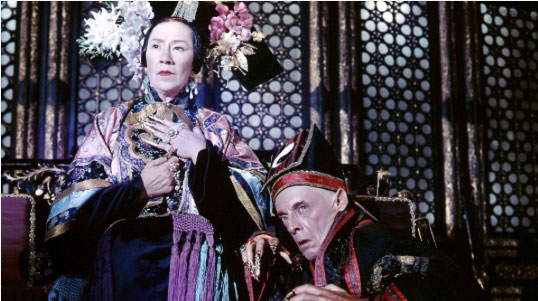
55 Days at Peking – film review: The diplomats found themselves holed up in the Peking legation compound awaiting relief by their armies with nothing but Chuck Heston’s US Major Lewis, David Niven’s Sir Arthur Robertson, and Ava Gardner’s Baroness Natasha Ivanoff (as the romantic interest) between them and the Yellow nightmare. 3 February 2008
Yellow Face by David Henry Hwang, theatre review, South China Morning Post, 9 June 2013: The Tony award-winning playwright and three-time Pulitzer Prize Drama finalist addresses the yellowface monster.
FAQs for the BBC, casting directors and reviewers. “Is it true that East Asians can only play East Asians?” and other corkers.
The politics of Yellowface and sinophobia
CHINA: thirty years of political and cultural analysis and commentary covering western designs on China
READ MORE >>>
SHAKEDOWN TIMELINE: America’s 21st century war on China. An epic collection of Anna Chen’s writing and broadcast strung on a narrative through-line. Twenty five years of political and cultural issues about China, its history and the diaspora. How America builds its “strategic competition” casus belli label into Opium Wars 2 and World War 3.
READ MORE >>>
The Sleep of Reason Produces Monsters from the West’s Own Id: No Cold War on China. The people who brought us AUSTERITY, then sold us BREXIT on the promise of a trade deal with China beyond the dreams of avarice, are the same Empire Crusaders who now want a war with it. China is the newly rich kid who’s strayed onto mafia turf and is about to be rolled. Full text of Anna Chen’s online speech at the No Cold War on China meeting, 13th January 2021
READ MORE >>>
Sinophobia: How racism has its roots in politics. In an effort to “contain” China’s rise, the US is using every dirty trick it can muster to retain its status as sole hegemon. Unable to cooperate or compete fairly, it’s busy promoting hate at macro and micro levels. Full text of speech at the online event hosted by The Society for Anglo-Chinese Understanding (SACU) 6th April 2021
READ MORE >>>
Opium Wars 2 and the propaganda war on China: No Cold War launch. Discussing the build-up in hostility towards China in the context of the Opium Wars of the 19th century and the propaganda war leading us there once again. At the start of the first Opium War in 1839, China was the most technologically advanced country in the world. It had already invented hydraulics, gunpowder in the 9th century, ships’ rudders, the stirrup, paper, moveable type printing and much more.
Video and text of Anna Chen’s speech, 16 June 2021
READ MORE >>>
A Permanent Reservoir of Scapegoats: how racism drives the geopolitics of China’s rise. America has become a supernova, both imploding and exploding at the same time, leaving a fragmented shell of its former self. Unfortunately, it seems intent on dragging us all to hell with it. Video and text of Anna Chen’s speech, 6 October 2021
READ MORE >>>
The West’s propaganda modus operandi: a short 21st century timeline of the race to World War III. When China explored the world in the 15th century and reached as far as East Africa, they traded a bit and brought back a giraffe.
When Europeans landed in the Americas in 1492, they killed and enslaved its native peoples, stole their treasures and gave them smallpox blankets in an early form of biological warfare.
The USA was literally built on an ancient Indian burial ground, because that’s what they’d turned it into.
And that’s pretty much been the template ever since. Video and text of Anna Chen’s speech, No Cold War event, 25 May 2022
READ MORE >>>
SUZY WRONG HUMAN CANNON AT THE EDINBURGH FRINGE FESTIVAL 1994. Written and performed by Anna Chen, this was the first show by a Chinese Brit to play the festival. A ground-breaking challenge thrown down to the degrading stereotypes embedded deeply in western culture, uncovering hidden dynamics and making visible the pernicious way in which these representations thrive.
“Charming, witty and sophisticated … I am entranced, won over.” SUNDAY TIMES
“Hard hitting and often hilarious … arresting … engrossing and provoking.” THE SCOTSMAN READ MORE >>>
See also Chopsticks at Dawn: orientalism in western music – BBC Radio 4, 7 June 2010. The genesis of that irritating cartoon music cliché.
Yellowface I’m Yellowface Gonna eat your soul I’m Yellowface I’m Yellowface Gonna swallow you whole I’m Yellowface Make you scrabble like a mole in a hole For every little part, any little role Make you thank me for the things I stole I’m Yellowface Endless night no hope in sight You're crazy for a chink of light Keep you polite, out of the damn fight Creature of the night No sense of right You know what else? Youy’re lacking in height No sight of your own might Trite, no bite. I’m Yellowface Gonna keep you small I’m Yellowface I’m Yellowface Don’t see you at all I’m Yellowface I’m the devil with a shovel I’ll bury you good Deep in the woods Right where you stood ‘Cause you so slow and you knew I could I’m Yellowface Teeny little folk so cute, can I feed you? I think I need an electron miscroscope to see you Maybe a Hubble telescope to even get near you Wanna hug you, wanna hold you, ain't never gonna fear you I’m Yellowface I don’t wanna see you I’m Yellowface I just wanna be you Five minutes that’s all it takes To empty you out, hey, them’s the breaks Scoop you out hollow Like a ricy husk Chain you up, let you out at dusk Or maybe a week, that’s enough 'Cause you’re so meek and I’m very tough I’m Yellowface Gonna eat your soul, I’m Yellowface Gonna swallow you whole I’m the devil with a shovel I’ll bury you good Deep in the woods Right where you stood Coz you so slow and you knew I could I’m Yellowface Yellowface I'm Yellowface Anna Chen, June 2009
